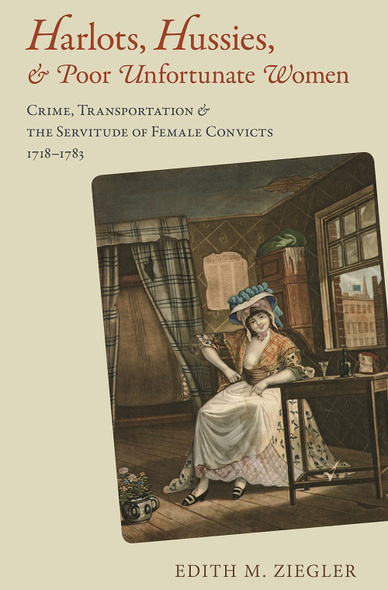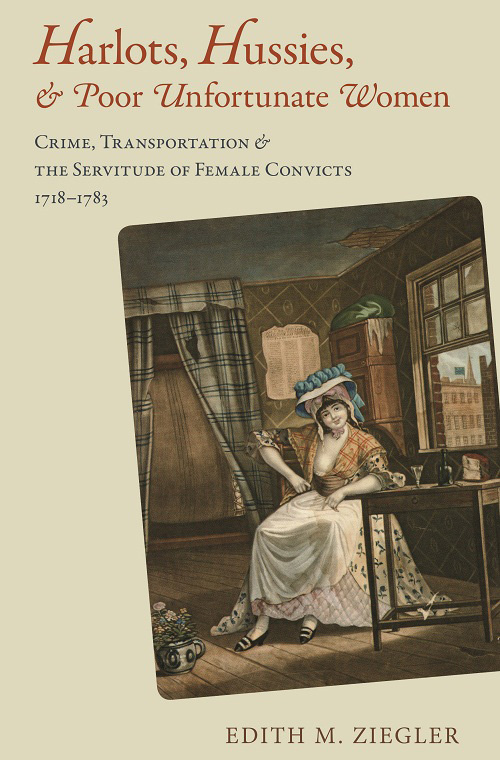Harlots, Hussies, and Poor Unfortunate Women
Crime, Transportation, and the Servitude of Female Convicts, 1718-1783
SERIES:
Atlantic Crossings
University of Alabama Press
In Harlots, Hussies, and Poor Unfortunate Women, Edith M. Ziegler recounts the history of British convict women involuntarily transported to Maryland in the eighteenth century.
Great Britain’s forced transportation of convicts to colonial Australia is well known. Less widely known is Britain’s earlier program of sending convicts—including women—to North America. Many of these women were assigned as servants in Maryland. Titled using epithets that their colonial masters applied to the convicts, Edith M. Ziegler’s Harlots, Hussies, and Poor Unfortunate Women examines the lives of this intriguing subset of American immigrants.
Basing much of her powerful narrative on the experiences of actual women, Ziegler restores individual faces to women stripped of their basic freedoms. She begins by vividly invoking the social conditions of eighteenth-century Britain, which suffered high levels of criminal activity, frequently petty thievery. Contemporary readers and scholars will be fascinated by Ziegler’s explanation of how gender-influenced punishments were meted out to women and often ensnared them in Britain’s system of convict labor.
Ziegler depicts the methods and operation of the convict trade and sale procedures in colonial markets. She describes the places where convict servants were deployed and highlights the roles these women played in colonial Maryland and their contributions to the region’s society and economy. Ziegler’s research also sheds light on escape attempts and the lives that awaited those who survived servitude.
Mostly illiterate, convict women left few primary sources such as diaries or letters in their own words. Ziegler has masterfully researched the penumbra of associated documents and accounts to reconstruct the worlds of eighteenth-century Britain and colonial Maryland and the lives of these unwilling American settlers. In illuminating this little-known episode in American history, Ziegler also discusses not just the fact that these women have been largely forgotten, but why. Harlots, Hussies, and Poor Unfortunate Women makes a valuable contribution to American history, women’s studies, and labor history.
Great Britain’s forced transportation of convicts to colonial Australia is well known. Less widely known is Britain’s earlier program of sending convicts—including women—to North America. Many of these women were assigned as servants in Maryland. Titled using epithets that their colonial masters applied to the convicts, Edith M. Ziegler’s Harlots, Hussies, and Poor Unfortunate Women examines the lives of this intriguing subset of American immigrants.
Basing much of her powerful narrative on the experiences of actual women, Ziegler restores individual faces to women stripped of their basic freedoms. She begins by vividly invoking the social conditions of eighteenth-century Britain, which suffered high levels of criminal activity, frequently petty thievery. Contemporary readers and scholars will be fascinated by Ziegler’s explanation of how gender-influenced punishments were meted out to women and often ensnared them in Britain’s system of convict labor.
Ziegler depicts the methods and operation of the convict trade and sale procedures in colonial markets. She describes the places where convict servants were deployed and highlights the roles these women played in colonial Maryland and their contributions to the region’s society and economy. Ziegler’s research also sheds light on escape attempts and the lives that awaited those who survived servitude.
Mostly illiterate, convict women left few primary sources such as diaries or letters in their own words. Ziegler has masterfully researched the penumbra of associated documents and accounts to reconstruct the worlds of eighteenth-century Britain and colonial Maryland and the lives of these unwilling American settlers. In illuminating this little-known episode in American history, Ziegler also discusses not just the fact that these women have been largely forgotten, but why. Harlots, Hussies, and Poor Unfortunate Women makes a valuable contribution to American history, women’s studies, and labor history.
Australian historian Edith M. Ziegler is an adjunct lecturer in the School of Humanities at the University of New England in Australia. She is the author of Schools in the Landscape: Localism, Cultural Tradition and the Development of Alabama’s Public Education System, 1865–1915.
List of Illustrations
Acknowledgments
Introduction
1. Social Change, Crime, and the Law
2. Punishment, Pleas, and the Prospect of Exile
3. Bound for Maryland
4. Arrival in the New World
5. Servants and Masters
6. Escape
7. Going Home and Staying On
8. Mary Nobody in the Republic of Virtue
Appendix 1: Statistical Information on Convivt Women
Appendix 2: List of Convict Women's Occupations
Appendix 3: Privy Council Resolution, 1615
Appendix 4: Transportation Act of 1718
Appendix 5: Crimes Punished by Transportation at the Old Bailey 1718–1776
Appendix 6: Colonial Legislation Regarding Convicts
Notes
Bibliography
Index
Acknowledgments
Introduction
1. Social Change, Crime, and the Law
2. Punishment, Pleas, and the Prospect of Exile
3. Bound for Maryland
4. Arrival in the New World
5. Servants and Masters
6. Escape
7. Going Home and Staying On
8. Mary Nobody in the Republic of Virtue
Appendix 1: Statistical Information on Convivt Women
Appendix 2: List of Convict Women's Occupations
Appendix 3: Privy Council Resolution, 1615
Appendix 4: Transportation Act of 1718
Appendix 5: Crimes Punished by Transportation at the Old Bailey 1718–1776
Appendix 6: Colonial Legislation Regarding Convicts
Notes
Bibliography
Index






